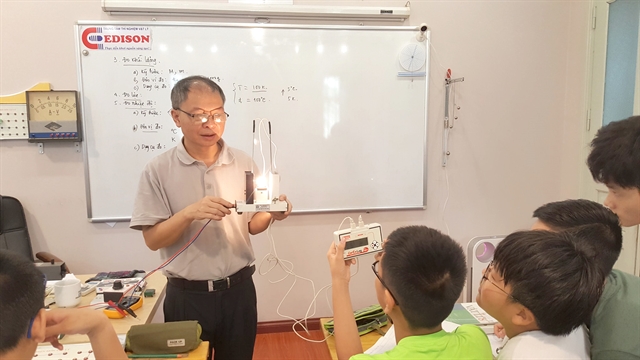 Society
Society

“Since I start teaching physics, doing experiments is always an indispensable part in my classroom.”

|
| Teacher Mai Văn Túc instructs students at the Edison Physics Experimental Centre he created at his house. — Photo courtesy of the centre |
HÀ NỘI — Physics teacher Mai Văn Túc is well-known for his fixing and tinkering.
Old radios, broken clocks, faulty telephones, all get a new lease of life after Túc has weaved his magic. So when he had a clear out and sold off many of the items he has fixed over the years, a few eyebrows were raised.
But there was a method behind his madness.
Túc, who works at the High School for Gifted Students under Vietnam National University, Hanoi, loves the subject he teaches so much, he has decided to take his work home with him, by building a laboratory in his house.
Born to a poor family, Túc was determined to study since childhood in a bid to change his life for the better. After graduating from university, majoring in radio, he didn’t find work immediately.
“Because of what I learned at university and what I taught myself, I’m quite good at fixing things,” he said. “People usually asked me to fix their broken items and I was happy to help."
Túc knows that books and lectures are important, but when it comes to teaching, nothing beats the hands-on approach.
He added: “Since I start teaching physics, doing experiments is always an indispensable part in my classroom.”
Some experiments took time and effort, both at school and at home, but they were really helpful for his students to learn.
However, Túc found that few teachers conducted experiments in class and students did not have chance to go to labs.
“I had thought about a lab where teachers and students could access proper equipment, tools and instructions to improve experimental skills,” Túc said.
So at his home on Vũ Hữu Street in Hà Nội he created a lab that is open for students from sixth grade to university and physics teachers in Hà Nội and other provinces.
It is called the Edison Physics Experimental Centre and since it opened four years ago, has helped students of all ages.
Hundreds of experiments sets are available at the centre. Most were made by Túc and his colleagues, others were bought when he took his students abroad for international competitions.
Besides basic experimental sets for lessons at schools, there are other advanced sets which aims to create challenges and inspire students’ creation in selecting materials, structures and options to design models.
An electrical model made by Túc can be used to do 500 different experiments from secondary schools to university levels.
He said that he preferred instructing students to approach new theory thanks to equipment and experiments in which they could understand matters easier.
“It helps save time rather than describing with words,” Túc said, adding that experiments also help learners understand clearly about the nature of the phenomenon and how the rules of physics affect things in daily life.
In a lesson on measuring length, Túc asked students to take measurements and show them the consequences of what would happen if they made mistakes.
In another lesson on measuring weight, Túc asked students to identify Việt Nam’s land area after weighing the nation’s map using just a scale and scissors.
During the COVID-19 pandemic, many Vietnamese and foreign students have gone to Túc’s lab and conducted experiments and then sent results to their professors in other countries.
“A top priority of the centre is to make practicing go hand in hand with theory,” Túc said.
“I’m looking forward to helping Vietnamese students be good at physics and then confidently apply what they learn in daily life and work.”
Đỗ Đoàn Đức, a teacher working at Túc’s centre said students there could learn much thanks to experimental sets, many of which were designed like games to make learning fun.
“At the centre, students can also make and monitor robots which support them in doing experiments or other activities,” Đức said.
“Having a great time with science and technology during school is expected to nurture their passion and dreams for the future,” he said. — VNS




